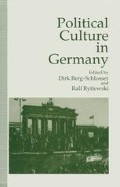Abstract
The breakdown of Communism in Eastern Europe has been characterized as the ‘black Friday of the social sciences’ by Klaus von Beyme (1990a, p.472). Few had theorized about and even fewer had predicted the end of the former Stalinist regimes and with them the collapse of the post-1945 bipolar structure and Soviet hegemony in the region. All the East European states are now enmeshed in a transition that many hope will lead to stable democratic order. Whether this will occur or not is, as with the breakdown, something social science cannot predict today. But, in the case of the GDR, this may be less problematic in both theoretical and practical terms. The German problem, at least in the eyes of some Germans, was solved with the unification. Of all the nations that are now in the process of transition to democracy, what was once the GDR is in a privileged position: The former GDR is about to slip into a new paternalistic relationship, in order to allow all its problems to be solved by a big brother’ (von Beyme 1990b, p.180).
Access this chapter
Tax calculation will be finalised at checkout
Purchases are for personal use only
Preview
Unable to display preview. Download preview PDF.
Notes
In the poll taken by INFAS in January 1990 the SPD achieved a 66 per cent approval rating. In the polls of the Zentralinstitut für Jugend at the end of January and early February the SPD ranked highest with support levels of 53 and 65 per cent, whereas the CDU only obtained 13 per cent in the first of these polls. In the last poll taken by Allensbach one week before the Volkskammer election, support for the CDU had risen to 47 per cent while the SPD’s had declined to just 27 per cent (see Sieger 1990 p.333, Table 3).
In addition to the studies referred to here there are a number of other reports on the GDR elections, including M. Berger et al. (1990), Feist and Hoffmann (1991), INFAS (1990) and Jung (1990).
Sieger (1990, pp.336–7) has documented this volatility or these moods with respect to the issue of support of socialism and unification.
The electoral data used in the section are drawn from the following sources: Wahlkommission der DDR (1990), Wahlkommission der DDR and Statistisches Amt der DDR (1990), Gemeinsames Statistishes Amt in Berlin (1990). The socio-economic data were generously supplied by the Staatliche Zentralverwaltung für Statistik.
A remarkable aspect of the Kommunal elections in May was the very large share of invalid notes. On average, approximately 6.5 per cent of all votes were declared invalid in this election. This was far higher than the levels registered in the Vokskammer election (slightly more than half a per cent), the Landtag elections (slightly less than 3 per cent) and the Bundestag election in the area of the former GDR in December (1.6 per cent). Voting procedures in this election were more complicated than in the others, as indeed they are in most Kommunal elections in the original Bundesrepublik. However, in the latter, invalid votes accounted for slightly less than 2 per cent of all votes in a sample of elections from 50 Gemeinden (municipalities) in the period from 1981 to 1985. This 2 per cent figure is about twice the level that one generally finds in other types of elections in the Bundesrepublic (0.94 per cent for Bundestag elections during the 1980s and 1.15 per cent for the Landtag elections during the period 1985–9). It is clear that the complexity of the voting system employed in local elections diminishes the capacity of the electorate successfully to translate their preferences into valid votes, and this effect was very pronounced in the GDR Kommunal election.
Notable here though is the fact that participation by voters in the area of the former Bundesrepublik was at a much lower level than in the three previous Bundestag elections.
The CDU merged with the DBD. The FDP is the merger of the three liberal parties/groups.
While there were originally 227 districts in the GDR region at the beginning of the series of 1990 elections, variation in the number of districts included within our analysis was dictated by such factors as (1) the need to exclude one notional district wherein citizens living overseas are aggregated, (2) the failure of a party to contest the election in the district or to have joined in an electoral coalition within a district, and (3) the merger of one of the districts in the Halle region after the Volkskammerwahl.
Best points out that the many surveys concerning the attitudes of the West German people towards unification and commissioned mainly by the Federal Ministry of Inner German Affairs are still not available.
Feist’s report is based on a survey conducted by INFAS between September and November of 1990.
Schacht (1990) discusses this specific issue from the perspective of the SPD.
Editor information
Editors and Affiliations
Copyright information
© 1993 Dirk Berg-Schlosser and Ralf Rytlewski
About this chapter
Cite this chapter
Cusack, T.R., Eberwein, WD. (1993). The Endless Election: 1990 in the German Democratic Republic. In: Berg-Schlosser, D., Rytlewski, R. (eds) Political Culture in Germany. Palgrave Macmillan, London. https://doi.org/10.1007/978-1-349-22765-5_14
Download citation
DOI: https://doi.org/10.1007/978-1-349-22765-5_14
Publisher Name: Palgrave Macmillan, London
Print ISBN: 978-1-349-22767-9
Online ISBN: 978-1-349-22765-5
eBook Packages: Palgrave Political & Intern. Studies CollectionPolitical Science and International Studies (R0)

